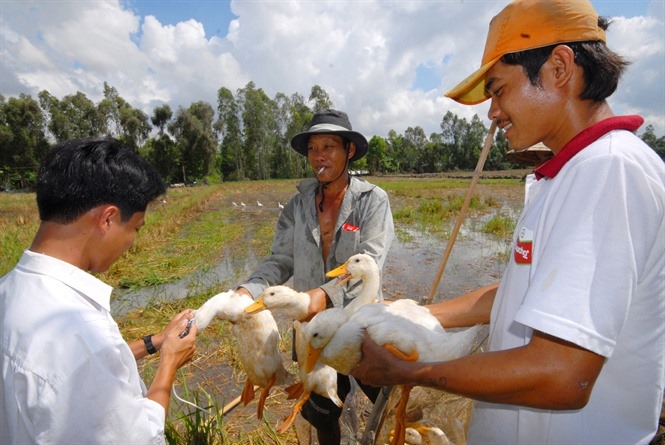 Society
Society

As the flood season continues in the Mekong Delta region, fears of epidemics in cattle and poultry has led to a focus on disease prevention.
 |
| Poultry check: Veterinarians and duck breeders in Vĩnh Long Province inspect poultry for disease. – Photo nongnghiep.vn |
HÀ NỘI — As the flood season continues in the Mekong Delta region, fears of epidemics in cattle and poultry has led to a focus on disease prevention.
This has led the An Giang Province Department of Animal Husbandry and Veterinary to set up disease-free poultry breeding areas. The provincial People’s Committee has also approved a 2017-20 plan to controll outbreaks.
Authorities have prepared a step-by-step plan to eradicate the avian-flu pandemic, ensure the safety of livestock and poultry, maintain human health and preserve the ecological environment.
According to the department, the situation is stable. The main ongoing problems are sun-stroke and loss of appetite among animals and poultry. This has been addressed by veterinarians. There were no cases of serious diseases such as foot and mouth disease, blue ear or avian flu.
The total number of infected animals and poultry was 7,926, of which 262 died - a cure rate of 97 per cent.
Workers at animal breeding centres and veterinarians are closely monitoring stock for any outbreak of disease.
Under the 2017-20 plan, local authorities have vaccinated against bird flu, foot-and-mouth disease and blue ear. They have also disinfected areas for poultry breeding, trading and slaughtering.
The department will co-ordinate with localities to further manage the transport and slaughter of animals. This is aimed at controlling the illegal slaughter of cattle and poultry to ensure food hygiene.
Lê Thanh Tùng, director of Vĩnh Long Province’s Animal Husbandry and Veterinary Department, said "The monitoring of diseases in animals is being carried out strictly. Pets are fully vaccinated, so there is very little chance of disease. Disease outbreak is handled in a timely manner, so there is no spread or serious damage.
“Since the beginning of this year, more than seven million chickens and ducks have been vaccinated against avian influenza. Bird flu was reported in only a small number of households.
"As awareness of disease has increased among livestock breeders, they have become more proactive in preventing disease. Most farmers actively vaccinate their poultry," he said.
According to Tùng, many years ago, ducklings bred in the field were at the risk of spreading A H5N1 influenza due to the habit of ducks moving in flocks from one place to another, making it difficult to manage diseases.
At present, ducks bred in the field are managed by the local animal department. Poultry are vaccinated, reducing the fear of disease. Department statistics show that more than 2.5 million live ducks were treated.—VNS




